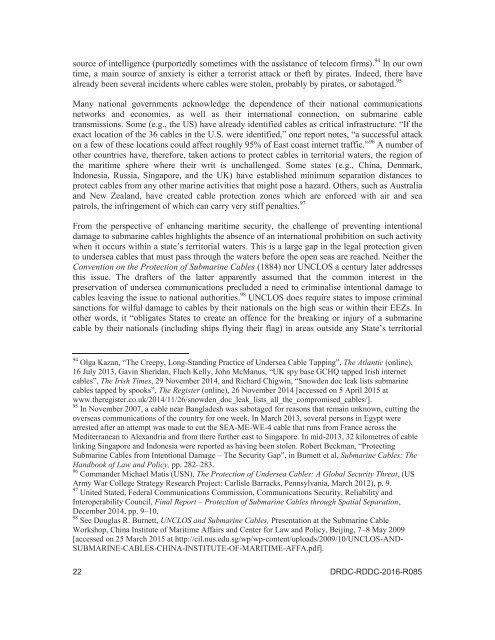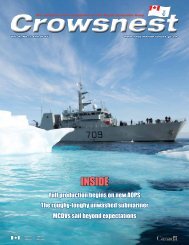Create successful ePaper yourself
Turn your PDF publications into a flip-book with our unique Google optimized e-Paper software.
source <strong>of</strong> intelligence (purportedly sometimes with <strong>the</strong> assistance <strong>of</strong> telecom firms). 94 In our own<br />
time, a main source <strong>of</strong> anxiety is ei<strong>the</strong>r a terrorist attack or <strong>the</strong>ft by pirates. Indeed, <strong>the</strong>re have<br />
already been several incidents where cables were stolen, probably by pirates, or sabotaged. 95<br />
Many national governments acknowledge <strong>the</strong> dependence <strong>of</strong> <strong>the</strong>ir national communications<br />
networks <strong>and</strong> economies, as well as <strong>the</strong>ir international connection, on submarine cable<br />
transmissions. Some (e.g., <strong>the</strong> US) have already identified cables as critical infrastructure. “If <strong>the</strong><br />
exact location <strong>of</strong> <strong>the</strong> 36 cables in <strong>the</strong> U.S. were identified,” one report notes, “a successful attack<br />
on a few <strong>of</strong> <strong>the</strong>se locations could affect roughly 95% <strong>of</strong> East coast internet traffic.” 96 A number <strong>of</strong><br />
o<strong>the</strong>r countries have, <strong>the</strong>refore, taken actions to protect cables in territorial waters, <strong>the</strong> region <strong>of</strong><br />
<strong>the</strong> maritime sphere where <strong>the</strong>ir writ is unchallenged. Some states (e.g., China, Denmark,<br />
Indonesia, Russia, Singapore, <strong>and</strong> <strong>the</strong> UK) have established minimum separation distances to<br />
protect cables from any o<strong>the</strong>r marine activities that might pose a hazard. O<strong>the</strong>rs, such as Australia<br />
<strong>and</strong> New Zeal<strong>and</strong>, have created cable protection zones which are enforced with air <strong>and</strong> sea<br />
patrols, <strong>the</strong> infringement <strong>of</strong> which can carry very stiff penalties. 97<br />
From <strong>the</strong> perspective <strong>of</strong> enhancing maritime security, <strong>the</strong> challenge <strong>of</strong> preventing intentional<br />
damage to submarine cables highlights <strong>the</strong> absence <strong>of</strong> an international prohibition on such activity<br />
when it occurs within a state’s territorial waters. This is a large gap in <strong>the</strong> legal protection given<br />
to undersea cables that must pass through <strong>the</strong> waters before <strong>the</strong> open seas are reached. Nei<strong>the</strong>r <strong>the</strong><br />
Convention on <strong>the</strong> Protection <strong>of</strong> Submarine Cables (1884) nor UNCLOS a century later addresses<br />
this issue. <strong>The</strong> drafters <strong>of</strong> <strong>the</strong> latter apparently assumed that <strong>the</strong> common interest in <strong>the</strong><br />
preservation <strong>of</strong> undersea communications precluded a need to criminalise intentional damage to<br />
cables leaving <strong>the</strong> issue to national authorities. 98 UNCLOS does require states to impose criminal<br />
sanctions for wilful damage to cables by <strong>the</strong>ir nationals on <strong>the</strong> high seas or within <strong>the</strong>ir EEZs. In<br />
o<strong>the</strong>r words, it “obligates States to create an <strong>of</strong>fence for <strong>the</strong> breaking or injury <strong>of</strong> a submarine<br />
cable by <strong>the</strong>ir nationals (including ships flying <strong>the</strong>ir flag) in areas outside any State’s territorial<br />
94 Olga Kazan, “<strong>The</strong> Creepy, Long-St<strong>and</strong>ing Practice <strong>of</strong> Undersea Cable Tapping”, <strong>The</strong> Atlantic (online),<br />
16 July 2013, Gavin Sheridan, Flach Kelly, John McManus, “UK spy base GCHQ tapped Irish internet<br />
cables”, <strong>The</strong> Irish Times, 29 November 2014, <strong>and</strong> Richard Chigwin, “Snowden doc leak lists submarine<br />
cables tapped by spooks”, <strong>The</strong> Register (online), 26 November 2014 [accessed on 5 April 2015 at<br />
www.<strong>the</strong>register.co.uk/2014/11/26/snowden_doc_leak_lists_all_<strong>the</strong>_compromised_cables/].<br />
95 In November 2007, a cable near Bangladesh was sabotaged for reasons that remain unknown, cutting <strong>the</strong><br />
overseas communications <strong>of</strong> <strong>the</strong> country for one week. In March 2013, several persons in Egypt were<br />
arrested after an attempt was made to cut <strong>the</strong> SEA-ME-WE-4 cable that runs from France across <strong>the</strong><br />
Mediterranean to Alex<strong>and</strong>ria <strong>and</strong> from <strong>the</strong>re fur<strong>the</strong>r east to Singapore. In mid-2013, 32 kilometres <strong>of</strong> cable<br />
linking Singapore <strong>and</strong> Indonesia were reported as having been stolen. Robert Beckman, “Protecting<br />
Submarine Cables from Intentional Damage – <strong>The</strong> Security Gap”, in Burnett et al, Submarine Cables: <strong>The</strong><br />
H<strong>and</strong>book <strong>of</strong> Law <strong>and</strong> Policy, pp. 282–283.<br />
96 Comm<strong>and</strong>er Michael Matis (USN), <strong>The</strong> Protection <strong>of</strong> Undersea Cables: A Global Security Threat, (US<br />
Army War College Strategy Research Project: Carlisle Barracks, Pennsylvania, March 2012), p. 9.<br />
97 United Stated, Federal Communications Commission, Communications Security, Reliability <strong>and</strong><br />
Interoperability Council, Final Report – Protection <strong>of</strong> Submarine Cables through Spatial Separation,<br />
December 2014, pp. 9–10.<br />
98 See Douglas R. Burnett, UNCLOS <strong>and</strong> Submarine Cables, Presentation at <strong>the</strong> Submarine Cable<br />
Workshop, China Institute <strong>of</strong> <strong>Maritime</strong> Affairs <strong>and</strong> Center for Law <strong>and</strong> Policy, Beijing, 7–8 May 2009<br />
[accessed on 25 March 2015 at http://cil.nus.edu.sg/wp/wp-content/uploads/2009/10/UNCLOS-AND-<br />
SUBMARINE-CABLES-CHINA-INSTITUTE-OF-MARITIME-AFFA.pdf].<br />
22 DRDC-RDDC-2016-R085




